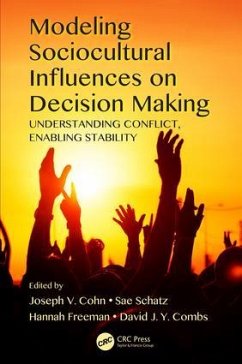Modeling Sociocultural Influences on Decision Making
Understanding Conflict, Enabling Stability
Herausgeber: Cohn, Joseph V; Combs, David J Y; Freeman, Hannah; Schatz, Sae
Modeling Sociocultural Influences on Decision Making
Understanding Conflict, Enabling Stability
Herausgeber: Cohn, Joseph V; Combs, David J Y; Freeman, Hannah; Schatz, Sae
- Gebundenes Buch
- Merkliste
- Auf die Merkliste
- Bewerten Bewerten
- Teilen
- Produkt teilen
- Produkterinnerung
- Produkterinnerung
Cross Cultural Decision Making seeks to understand the impact that a variety of influences including geographical, historical, sociological, organizational, team, and technology have on an individual's decision making processes. This book proposes to explore how advances in information and social media technologies, as well as modeling and simulation tools, can be leveraged to represent and characterize a culture's decision making processes, providing an alternative means for gaining a shared cultural understanding in today's hi-tech and globally interconnected world.
Andere Kunden interessierten sich auch für
![Decision-Making in High Risk Organizations Under Stress Conditions Decision-Making in High Risk Organizations Under Stress Conditions]() Anthony J SpurginDecision-Making in High Risk Organizations Under Stress Conditions117,99 €
Anthony J SpurginDecision-Making in High Risk Organizations Under Stress Conditions117,99 €![Handbook of Human Factors in Web Design Handbook of Human Factors in Web Design]() Handbook of Human Factors in Web Design280,99 €
Handbook of Human Factors in Web Design280,99 €![Hazardous Chemicals Hazardous Chemicals]() T S S DikshithHazardous Chemicals261,99 €
T S S DikshithHazardous Chemicals261,99 €![Designing for Situation Awareness Designing for Situation Awareness]() Mica R EndsleyDesigning for Situation Awareness289,99 €
Mica R EndsleyDesigning for Situation Awareness289,99 €![Definitions, Conversions, and Calculations for Occupational Safety and Health Professionals Definitions, Conversions, and Calculations for Occupational Safety and Health Professionals]() Edward W FinucaneDefinitions, Conversions, and Calculations for Occupational Safety and Health Professionals184,99 €
Edward W FinucaneDefinitions, Conversions, and Calculations for Occupational Safety and Health Professionals184,99 €![Human Factors of a Global Society Human Factors of a Global Society]() Human Factors of a Global Society204,99 €
Human Factors of a Global Society204,99 €![Cultural Factors in Systems Design Cultural Factors in Systems Design]() Cultural Factors in Systems Design139,99 €
Cultural Factors in Systems Design139,99 €-
-
-
Cross Cultural Decision Making seeks to understand the impact that a variety of influences including geographical, historical, sociological, organizational, team, and technology have on an individual's decision making processes. This book proposes to explore how advances in information and social media technologies, as well as modeling and simulation tools, can be leveraged to represent and characterize a culture's decision making processes, providing an alternative means for gaining a shared cultural understanding in today's hi-tech and globally interconnected world.
Produktdetails
- Produktdetails
- Verlag: CRC Press
- Seitenzahl: 576
- Erscheinungstermin: 27. September 2016
- Englisch
- Abmessung: 254mm x 185mm x 38mm
- Gewicht: 1157g
- ISBN-13: 9781498736695
- ISBN-10: 1498736696
- Artikelnr.: 45751415
- Herstellerkennzeichnung
- Libri GmbH
- Europaallee 1
- 36244 Bad Hersfeld
- gpsr@libri.de
- Verlag: CRC Press
- Seitenzahl: 576
- Erscheinungstermin: 27. September 2016
- Englisch
- Abmessung: 254mm x 185mm x 38mm
- Gewicht: 1157g
- ISBN-13: 9781498736695
- ISBN-10: 1498736696
- Artikelnr.: 45751415
- Herstellerkennzeichnung
- Libri GmbH
- Europaallee 1
- 36244 Bad Hersfeld
- gpsr@libri.de
Joseph V. Cohn, PhD, earned his BS in biology from the University of Illinois-Urbana Champaign in 1993. He earned his PhD in neuroscience from Brandeis University in 1998. He has coauthored more than 100 publications and presented talks to national and international professional conferences on a host of topics, ranging from foundational neuroscience to the nature of technical innovation. He has coedited a three-volume book series focusing on all aspects of training system development and a single-volume book on enhancing human performance in high-risk environments. He has received industry and professional society awards for his research across the spectrum of the human performance and biomedical sciences. He cochaired the Applied Human Factors and Ergonomics Association's Cross-Cultural Decision Making Conference from 2013 to 2015 and is a fellow of the American Psychological Association and the Society of Military Psychologists, as well as an associate fellow of the Aerospace Medical Association. Sae Schatz, PhD, is an applied human-systems researcher, learning science professional, and cognitive scientist. She has headed an array of applied research efforts, authored more than 50 peer-reviewed scholarly publications, led the development of three military textbooks, and received industry awards for both her publications and her research efforts. Schatz cochairs the Applied Human Factors and Ergonomics Association's Cross-Cultural Decision Making Conference (2013-), is a service principal for the Interservice/Industry Training, Simulation and Education Conference (2015-), and supports international science and technology working groups associated with the North Atlantic Treaty Organization, Partnership for Peace, and The Technical Cooperation Program. Schatz also maintains close ties with her alma mater, the University of Central Florida, where she earned her PhD in human systems in modeling and simulation in 2008. Hannah Freeman earned her Bachelor of Arts degrees in international studies (Russian and Eastern European studies) and Hispanic studies from Illinois Wesleyan University, where she was awarded Phi Beta Kappa, in 2012. Freeman earned her Master of Science degree in comparative politics (conflict studies) from The London School of Economics and Political Science in 2013, where she also received a Russian Language Certificate. Her research interests include the former Soviet Union and Soviet bloc, post-Soviet Russia, human rights, national and ethnic conflict, radicalization, political violence, and terrorism. David J. Y. Combs, PhD, earned his BA in psychology from Simpson University in 2003. He earned his PhD in experimental social psychology from the University of Kentucky in 2010. He has also completed certifications in political psychology (Stanford University), analysis of incomplete data sets (University of Michigan), and Afghanistan-Pakistan regional expertise. He has completed additional coursework (applied survey sampling) with The George Washington University. He has coauthored dozens of papers, conference presentations, and book chapters on social psychological topics such as trust, attitude change, experience of humiliation, and emotions resulting from political events. He is especially interested in applying social psychological theory and methods to understanding cross-cultural interactions within the irregular warfare context.
Introduction
Section I Building Theories
Expeditionary Modeling for Megacities and Other Dense Urban Areas
More than Just a Story: Narrative Insights into Comprehension, Ideology, and Decision Making
The Spread of Information via Social Media
The Spread of Opinions in Societies
Culture's Influences on Cognitive Reflection
Cultural Influences on Cognitive Biases in Judgment and Decision Making: On the Need for New Theory and Models for Accidents and Safety
Section II Collecting and Analyzing Data
The Sixty Percent Mission: An Introduction to High-Risk Ethnography Process and Protocol in Support of the US Army's Civil Affairs Humanitarian Mission
Challenges in Connecting with the Disconnected: An Introduction to Connecting with Communities Disconnected from the Rest of the World
They Are Beyond WEIRD: Helpful Frameworks for Conducting Non-WEIRD Research
Deciphering the Emic Perspective in Data in Order to Assess Threat
Collecting Data and Semantic Content via Mobile Devices
Measuring Changes in Attitudes: Using Factor Analysis to Track Population Attitudes Spatially and Temporally
Gaining Insight by Applying Geographical Modeling
Section III Building and Validating Sociocultural Models
Sociocultural Capability Requirements across All Phases of Military Operations
Methods to Characterize and Manage Uncertainty for Sociocultural Applications
Validating Causal and Predictive Claims in Sociocultural Models
Rapid Generation of Political Conflict Simulations for Scenarios around the World
Detailed Model Development Case Study: The Peace Game
Section IV Applying Sociocultural Models to Gain Insight into Conflict and Instability
Using the Social Framework Model of Trust to Better Understand Trust in Government
Understanding Public Opinion toward Violent Extremists
Modeling Sociocultural Influences on Decision Making: Assessing Conflict and Stability
Modeling Social System Resiliency: An Agent-Based Multiscale Approach
Applying Modeling and Simulation to Foreign Policy: An Afghan Example
Subject Index
Author Index
Section I Building Theories
Expeditionary Modeling for Megacities and Other Dense Urban Areas
More than Just a Story: Narrative Insights into Comprehension, Ideology, and Decision Making
The Spread of Information via Social Media
The Spread of Opinions in Societies
Culture's Influences on Cognitive Reflection
Cultural Influences on Cognitive Biases in Judgment and Decision Making: On the Need for New Theory and Models for Accidents and Safety
Section II Collecting and Analyzing Data
The Sixty Percent Mission: An Introduction to High-Risk Ethnography Process and Protocol in Support of the US Army's Civil Affairs Humanitarian Mission
Challenges in Connecting with the Disconnected: An Introduction to Connecting with Communities Disconnected from the Rest of the World
They Are Beyond WEIRD: Helpful Frameworks for Conducting Non-WEIRD Research
Deciphering the Emic Perspective in Data in Order to Assess Threat
Collecting Data and Semantic Content via Mobile Devices
Measuring Changes in Attitudes: Using Factor Analysis to Track Population Attitudes Spatially and Temporally
Gaining Insight by Applying Geographical Modeling
Section III Building and Validating Sociocultural Models
Sociocultural Capability Requirements across All Phases of Military Operations
Methods to Characterize and Manage Uncertainty for Sociocultural Applications
Validating Causal and Predictive Claims in Sociocultural Models
Rapid Generation of Political Conflict Simulations for Scenarios around the World
Detailed Model Development Case Study: The Peace Game
Section IV Applying Sociocultural Models to Gain Insight into Conflict and Instability
Using the Social Framework Model of Trust to Better Understand Trust in Government
Understanding Public Opinion toward Violent Extremists
Modeling Sociocultural Influences on Decision Making: Assessing Conflict and Stability
Modeling Social System Resiliency: An Agent-Based Multiscale Approach
Applying Modeling and Simulation to Foreign Policy: An Afghan Example
Subject Index
Author Index
Introduction
Section I Building Theories
Expeditionary Modeling for Megacities and Other Dense Urban Areas
More than Just a Story: Narrative Insights into Comprehension, Ideology, and Decision Making
The Spread of Information via Social Media
The Spread of Opinions in Societies
Culture's Influences on Cognitive Reflection
Cultural Influences on Cognitive Biases in Judgment and Decision Making: On the Need for New Theory and Models for Accidents and Safety
Section II Collecting and Analyzing Data
The Sixty Percent Mission: An Introduction to High-Risk Ethnography Process and Protocol in Support of the US Army's Civil Affairs Humanitarian Mission
Challenges in Connecting with the Disconnected: An Introduction to Connecting with Communities Disconnected from the Rest of the World
They Are Beyond WEIRD: Helpful Frameworks for Conducting Non-WEIRD Research
Deciphering the Emic Perspective in Data in Order to Assess Threat
Collecting Data and Semantic Content via Mobile Devices
Measuring Changes in Attitudes: Using Factor Analysis to Track Population Attitudes Spatially and Temporally
Gaining Insight by Applying Geographical Modeling
Section III Building and Validating Sociocultural Models
Sociocultural Capability Requirements across All Phases of Military Operations
Methods to Characterize and Manage Uncertainty for Sociocultural Applications
Validating Causal and Predictive Claims in Sociocultural Models
Rapid Generation of Political Conflict Simulations for Scenarios around the World
Detailed Model Development Case Study: The Peace Game
Section IV Applying Sociocultural Models to Gain Insight into Conflict and Instability
Using the Social Framework Model of Trust to Better Understand Trust in Government
Understanding Public Opinion toward Violent Extremists
Modeling Sociocultural Influences on Decision Making: Assessing Conflict and Stability
Modeling Social System Resiliency: An Agent-Based Multiscale Approach
Applying Modeling and Simulation to Foreign Policy: An Afghan Example
Subject Index
Author Index
Section I Building Theories
Expeditionary Modeling for Megacities and Other Dense Urban Areas
More than Just a Story: Narrative Insights into Comprehension, Ideology, and Decision Making
The Spread of Information via Social Media
The Spread of Opinions in Societies
Culture's Influences on Cognitive Reflection
Cultural Influences on Cognitive Biases in Judgment and Decision Making: On the Need for New Theory and Models for Accidents and Safety
Section II Collecting and Analyzing Data
The Sixty Percent Mission: An Introduction to High-Risk Ethnography Process and Protocol in Support of the US Army's Civil Affairs Humanitarian Mission
Challenges in Connecting with the Disconnected: An Introduction to Connecting with Communities Disconnected from the Rest of the World
They Are Beyond WEIRD: Helpful Frameworks for Conducting Non-WEIRD Research
Deciphering the Emic Perspective in Data in Order to Assess Threat
Collecting Data and Semantic Content via Mobile Devices
Measuring Changes in Attitudes: Using Factor Analysis to Track Population Attitudes Spatially and Temporally
Gaining Insight by Applying Geographical Modeling
Section III Building and Validating Sociocultural Models
Sociocultural Capability Requirements across All Phases of Military Operations
Methods to Characterize and Manage Uncertainty for Sociocultural Applications
Validating Causal and Predictive Claims in Sociocultural Models
Rapid Generation of Political Conflict Simulations for Scenarios around the World
Detailed Model Development Case Study: The Peace Game
Section IV Applying Sociocultural Models to Gain Insight into Conflict and Instability
Using the Social Framework Model of Trust to Better Understand Trust in Government
Understanding Public Opinion toward Violent Extremists
Modeling Sociocultural Influences on Decision Making: Assessing Conflict and Stability
Modeling Social System Resiliency: An Agent-Based Multiscale Approach
Applying Modeling and Simulation to Foreign Policy: An Afghan Example
Subject Index
Author Index








